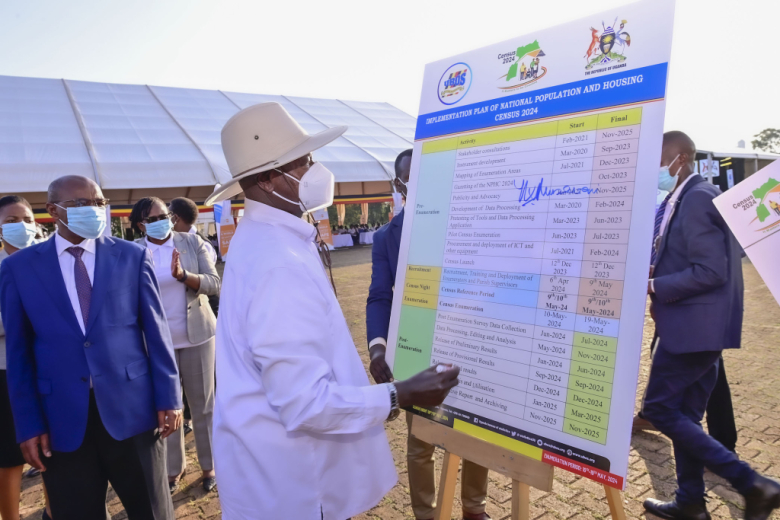
BY PPU REPORTER
President Yoweri Kaguta Museveni has launched the National Population and Housing Census (NPHC) 2024 at Kololo Independence Grounds.
During the ceremony, President Museveni thanked the management and staff of UBOS for the good work they have done in ensuring that census activities are always a success in Uganda.
“The aim of the counting seems to be how many people? Where are they? How are they? What do they own? And where are the services? These are the questions that will be answered,” he said.
“These questions are very crucial so that the government can plan for you better because you cannot plan properly for people you don't know. Let us get the census so that it gives us the answers to all these questions, and then we shall be able to know how to help them (Ugandans) better. The purpose of the counting is mainly planning,” he asserted.
President Museveni also made it clear that the nationwide exercise will begin on the night of May 9, 2024, and the next day, May 10th, 2024, will be observed as a public holiday to enable a large number of Ugandans to be counted.
“So, the public holiday will be the next day, May 10. I urge all Ugandans to stay in their homes and be counted,” H.E. Museveni stressed. He noted that the population of Uganda and Africa as a whole is growing and that it is a good thing.
“Africa used to be underpopulated. Remember that Africa is about 12 times the size of India; you can fit India in Africa 12 times. India is 1 million square miles, while Africa is 12 million square miles. However, until recently, India had a bigger population than Africa, but now Africa has taken over the population of India, and by 2025, the population of Africa is estimated to be 2.5 billion; it will be the biggest in the world,” President Museveni revealed.
“This means that all this time, for 4 and a half million years, Africa has been underpopulated. Why? Because Africa is good for man and his enemies like mosquitoes, Tsetse flies, microbes, and Ebola, what a view! All of them are here. So, to see that the population is now growing is a mark of the success of the post-independence governments of Africa. Here in Uganda, it's a dramatic example because the population was only 14 million in 1986, but it is now estimated to be 46 million; it has grown up to almost 4 times. Why? People are not dying as they used to die, and the ones who live live longer,” he added.
The Minister of Finance, Planning, and Economic Development, Hon. Matia Kasaija expressed gratitude towards the development partners like the United Nations Fund for Population Activities (UNFPA) and the World Bank that have supported the government of Uganda in implementing the statistical activities and are also involved in the 2024 census.
“I commend UBOS management and staff, for they have always lived up to our expectations. Congratulations, UBOS!” Hon. Kasaija said.
The Census 2024 will be the sixth such exercise to be conducted since Uganda gained independence in 1962. In particular, it will be the third to be conducted by UBOS, which was established by an Act of Parliament in 1998, and it will be the first paperless census.”
On his part, the Executive Director of UBOS, Dr. Chris Mukiza, thanked the government of Uganda for contributing 98 percent to fund the National Population and Housing Census 2024.
"This one is the first of its kind. In the previous one in 2014, the government funded 75 percent and then partners funded 25 percent, so now we are becoming self-sustaining, and this shows the strong interest and commitment the government of Uganda has in evidence-based planning and policy management,” he said.
“We want to thank you, Your Excellency, for your commitment. I always tell people that you are the biggest user of statistics in Uganda.”
He further noted that the census in 2024 will help to evaluate the performance of the National Development Plan III (NDPIII), which will end next financial year.
The representative of the UNFPA in Uganda, Ms. Gift Malunga, commended the Government of Uganda for prioritizing the 2024 national population and housing census. This commitment, she said, is evident in the impressive track record of funding the majority of previous census undertakings.
Every 10 years, Uganda holds a national census, and the last one was carried out in 2014.
The census figures play a critical role in guiding planning, policy formulation, and program implementation, as well as monitoring development progress in line with national goals and objectives.
The census exercise that will take place on May 9, 2024, will use digital technology to collect, process, and disseminate census results. The digital census will enable the Uganda Bureau of Statistics (UBOS) to produce accurate and timely demographic, social, and economic statistics.
According to UBOS, the country's current population is estimated at 45.5 million, with a growth rate of 30.4 percent.


